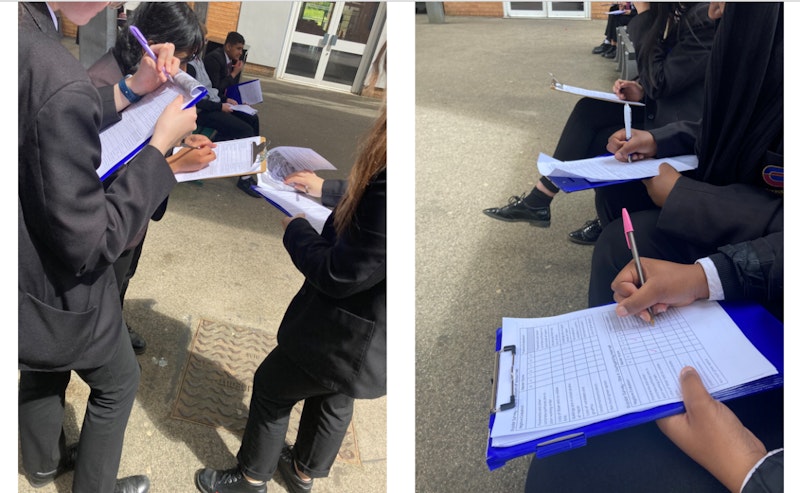Enrichment
Get Outside - it’s National Fieldwork Fortnight!

28th June 2023
Following on from the success of last year’s Geographical Association National Fieldwork Week, it is now National Fieldwork Fortnight. The next two weeks are the perfect excuse to leave your hot classrooms behind and take your classes outside to experience the geography that is all around them.
This year’s theme is ‘Environment', and there are so many opportunities all around your school to get involved in this, regardless of the year group you are teaching or the topic that you are currently covering.
Using the school site is often overlooked, but it shouldn’t be. This is the student’s everyday geography, and whilst they might see it every day, are they really taking it all in? Getting out and about around your school site allows your students to practice a wide range of geographical skills, including observation, collecting both qualitative and quantitative data, and practicing those all-important fieldwork techniques before embarking on fieldwork further afield.
A really simple investigation, which requires little-no fieldwork equipment, is “How can we improve our school site to make it more sustainable” students will always have ideas on how they would improve their school site, but this will encourage them to think like geographers when considering those improvements. Data for this investigation could be collected on a clipboard, tablet, or a mobile phone app such as ARCGIS Survey 123. Collecting it on a device will enable your students to export their data straight into ARCGIS, which will provide a great introduction to using GIS on a local scale.
Select 3-4 data collection sites around your school grounds and consider which types of data collection methods would work best, for example you could include environmental quality surveys, traffic counts, field sketches, observation records, photography and Likert surveys. Ensure that each site shows a contrast, for example, a heavily concreted playground area with little greenery, the school playing fields, and the school car park. In each site students could consider how well kept they are, how it could be made more environmentally friendly, and what needs to improve to make the facilities in that location last longer.

At KS4 and KS5, students could also design their own data collection sheets or trial their methods. Trailing their own methods, especially if their NEA is on a similar topic, is a great way to begin a pilot study or for students to experience designing their own data collection sheets for the first time. The current Year 12 students would have done very little in the way of fieldwork at GCSE, therefore, all fieldwork experience that can be gained is going to be vital to them in helping to propose and write a successful NEA project.
When students are collecting their data, it is also a great opportunity to discuss sustainability, for example, what does sustainability mean in the context of their school. Are there recycling bins? Are there recreation opportunities, and are they long-lasting, or do they need to be replaced? Is there green space? Could more be done to improve biodiversity on the school site? Is there enough done to promote sustainable transport options? There are so many opportunities for discussion around sustainability, which will help to improve students’ knowledge of this core geographical concept. Allowing them to experience investigating sustainability will make the concept more tangible and memorable.
Collecting data onsite will also give students more opportunities to experience a range of data presentation methods. This experience could be combined with their mathematical and scientific studies to make it truly cross-curricular. Their environmental quality surveys could be turned into radial diagrams or bar charts, and litter counts could become located pie charts. Tasking students to present their work using IT programmes will also test their GIS or Excel skills. Fieldwork doesn’t have to be limited to geography; considering the links to other subjects will further encourage students to understand the importance of geography and why it links to just about every subject in the school.
This could also be an opportunity to practice some extended writing. At our school, following this fieldwork, students write a letter to our SLT explaining how the school could be made more sustainable and what their data collection suggested about sustainability. We have had a wide range of solutions such as creating wildlife gardens, introducing bird and bat boxes, building equipment from eco-bricks and reducing the amount of single use plastic around the school site instead of just introducing more bins. Students could eloquently describe and explain the issues, pinpointing key problem locations around the school site as well as providing a clear analysis of their data. All good practice for future fieldwork efforts.
So, get outside in the next fortnight. Carry out some simple investigations and show students that geography really is all around them and for everyone!
For more ideas...
You might also like

GIS for the NEA: A Quick Start Guide for the Confused!
12th July 2023